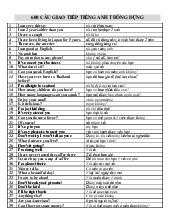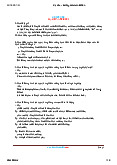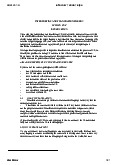









Preview text:
18:33 29/7/24 Cultural appropriation
The distinction between extraction of culture and collaboration with culture.
That is the key to solid and productive relationships built between cultures for the benefit of both groups. Questions:
Is cultural appropriation even a thing? Are ppl just appreciating it or just
appropriation? Is it something to celebrate?
Are all appropriation appreciation?
In what context does it call cultural appropriation?
Is cultural appropriation diluting heritages/cultures of a country?
Is cultural appropriation the real pain of cultures being taken advantage of and
forgotten, or is it the over-sensitivity of a part of the audience and the media? Outline:
Thesis statement: We believe that culture appropriation is diluting the
heritages & cultures of countries.
Imagine a person taking chicken stock, with soba noodles from Japan then
adding some leftover roasted turkey on top and they call it authentic pho. The
bad thing is they don't even know what pho is, they don't know the story behind
it, they have never even tasted the original pho, and they assume their dish to be
pho just bc of sum ppl who also don't understand pho or Vietnamese cuisine in
general told them it is. That is a typical example of a consequence coming from
globalization, which is called cultural appropriation, and that's what we're gonna
talk about today, and this is the story of, What If. So what if it is diluting the
cultures and making cultures disappear? We believe that cultural appropriation
is the real pain of cultures being diluted and being forgotten, and we are going
to prove that by answering some of these big questions throughout our
presentation (slide cau hoi -> doc slide). 1. Definition
1.1. What is cultural appropriation?
Taking off in the 1980s, the term cultural appropriation was first used in
academic spaces to discuss issues such as colonialism and the relationships about:blank 1/10 18:33 29/7/24 Cultural appropriation
between majority and minority groups. Like many such terms, cultural
appropriation eventually made its way out of the academy and into popular
culture. To fully understand its consequences, though, we need to make sure we
have a working definition of culture itself.
Historically, deciding exactly what culture is hasn9t been easy. The earliest
explanation comes from English anthropologist Edward Burnett Tylor, who
wrote in 1871 that belief, art, morals, law, custom, and any other capabilities and habits acquired
by man as a member of society.= So, Culture refers to anything associated with
a group of people based on their ethnicity, religion, geography, or social
environment. This might include beliefs, traditions, language, objects, ideas,
behaviors, customs, values, or institutions. Cultural Appropriation
Cultural appropriation refers to the use of objects or elements of a non-dominant
culture in a way that reinforces stereotypes or contributes to oppression and
doesn't respect their original meaning or give credit to their source and create misconception.1
It is also defined as taking something from a less-dominant culture in a way its
members find undesirable and offensive – so that its heritage is misused by
those in a position of privilege. Or it is the inappropriate or unacknowledged
adoption of an element or elements of one culture or identity by members of
another culture or identity. It may not be immediately obvious why adopting
elements from another culture can be harmful.
The truth is culture can't really be owned. For some that is a tragedy, for others
it9s offensive or merely a joke.2 1.2. Differences between cultural appreciation and cultural
appropriation/cultural borrowing
1 https://www.verywellmind.com/what-is-cultural-appropriation-5070458
2 https://www.gq-magazine.co.uk/article/the-trouble-with-cultural-appropriation about:blank 2/10 18:33 29/7/24 Cultural appropriation
Is all cultural appropriation just appreciation? In what context is the
situation considered insensitive and cultural appropriation?
So many ppl got mistaken between cultural appropriation and appreciating a
culture. But there9s a difference between appreciating a culture, which might
include enjoying food from another country, learning a new language,
celebrating or showing respect or honor for a culture, and appropriating it,
which involves taking something Some believe culture is exploited like land or natural resources were exploited
by colonialists, but desecrating a landscape is not the same as desecrating an
idea. The landscape can be ruined, but the idea remains. Culture is more
resilient than stone because it changes.
Diversity is celebrated but the wrong kind of diversity is branded inexcusable.
There has to be four elements present that separates cultural appreciation from appropriation:
1. The use of a cultural element in a different context from its original customary context.
2. A power imbalance between the source culture and the culture where the
element is being used. In other words, one group will be relatively
dominant in relation to the other.
3. No involvement from the source culture. So there9s no acknowledgement
of the source, there9s no retribution or contribution in terms of a payment
or another non-financial contribution and there9s also been no
cooperation, so there hasn9t been authorization that9s been asked for or
the source culture hasn9t participated in any way.
4. This causes harm. It can be economic harm; for example, if the sales of
the authentic products are harmed by the creation of a product that is culturally appropriates
It could also be a social harm, where the identity of the source culture is being
diluted, where the cultural appropriation perpetuates negative stereotypes that
could harm the identity of the group. It could also be cultural harm, where the
culture is being distorted, the meaning is lost, and this can cause offense and can about:blank 3/10 18:33 29/7/24 Cultural appropriation
be considered extremely disrespectful and insulting. If these four elements are
in place, we9re likely facing a case of cultural appropriation.3
But appropriation is harmful when it contributes to the further marginalization
of an already marginalized group.
If it reinforces stereotypes, erases cultural origins or exploits aspects of another
culture for social or financial benefit (and not the benefit of the group it's
appropriating from), it's definitely harmful appropriation. Context and power
dynamics matter here. That's why a white American who decides to learn to
cook Chinese food won't elicit much outcry. In fact, it's celebrated and
encouraged as a way to expand and diversify their worldviews through food.
But say a white American decides to drizzle some soy sauce on their food and
call it Chinese. Then they start doing it on all their food and building up a
personal brand as an "expert" on Chinese cuisine. Then they start profiting from
it and begin being recognized for this fake culinary expertise as an "influencer."
Now we've moved from innocuous to harmful acts of appropriation that have
reduced Chinese culinary culture and knowledge to a caricature, with no benefit
to actual Chinese people. Sometimes things get even messier than this. Different
affinity groups - based on race, ethnicity or gender identity - have experienced
different degrees of marginalization, and their members' reactions to specific
acts of cultural appropriation will vary as a result.4
1. Examples + explanations as to why it is cultural appropriation.
Uncle Roger is a fictional character on Youtube, who9s famous for making
reactions on this platform about Asian culture in general and Asian cuisine in
particular. He came up with reviewing Asian recipes from the famous UK chef
Jamie Oliver, whose Asian recipes are pretty much completely different from
the original recipes. The things that Jamie did including his Thai Green Curry,
his butter chicken and some other Asian recipes are nothing like the authentic
versions. Things might have already stopped until Nigel Ng, the creator of
Uncle Roger character, spoke about this in some of his podcast episodes. He
3 https://en.vogue.me/culture/vogue-investigates-state-of-cultural-appropriation/ 4
https://laist.com/news/racism-101-at-what-point-does-cultural-appreciation-cross-over-into-a ppropriation about:blank 4/10 18:33 29/7/24 Cultural appropriation
said that Jamie and his team already watched his videos, but they did not take
responsibility for their actions, they did not think they had done anything
wrong, and from that Nigel said Jamie used a nice way to say that he hated him.
Later on, Jamie changed his video title to Jamie9s version on those recipes, as
well as the video descriptions, but before that those videos have been up on
Youtube for quite a while now, and b4 that his recipes were claimed to be
authentic, also Jamie himself is an influential chef, who has at least a couple of
thousand views on some of his videos and a few millions on his more viral
recipes, so just imagine the number of ppl getting misconceptions about Asian
culture just from watching him.
(Diem) Another example that I think you guys already know. It9s an event that
A Chinese fashion brand has been accused of appropriating the 8ao dai,9
Vietnam9s traditional long gown, for its been showcased on the opening day of the China Fashion Week Spring/Summer
2019 in Beijing, China the previous day, by NE Tiger, Chinese clothing brand.
A majority of the collection comprised designs that appear indistinguishable
from Vietnam9s iconic ao dai, which is a long tight-fitting silk tunic worn over trousers.
Models donning these outfits even wore the 8non la,9 or palm-leaf conical hats,
that often go along with the ao dai as symbols of Vietnamese culture and
fashion. In the China Daily report, terms such as creation= were used to describe the costumes in NE Tiger9s collection.
Many Vietnamese readers have found it offensive that such Vietnamese
fashion-inspired designs are dubbed voiced their anger on social media, calling it another one of Beijing9s attempts
to spread its The designs had a similarity of almost 99% with Vietnamese Ao Dai and that
the palm-leaf conical hats were copied entirely without any retouch from the
traditional Vietnamese farmer9s hat. It is plagiarism and a stolen idea. This is
completely appropriate! Imagine when someone borrows your stuff and claims
it belongs to them? How would you feel? We agree that should culture is spread
and known widely, but it cannot be distorted! about:blank 5/10 18:33 29/7/24 Cultural appropriation
Those are the examples of cultural appropriation, so what does cultural
appreciation look like? Our topic today is about CAppro, but since many ppl
have problems defining this and CAppre, we would like to mention some of the examples of CAppre.
Take Gordon Ramsay for instance. He travels around the world, truly engaging
in the indegenous ppl9s activities, learning their cuisine, learning how their
cultures are being done right. Or like Nigel Ng, every time he makes a reaction
video, he has to take such heavy research on how the culture is done properly,
not to mention that he sometimes even post an IG story, asking ppl from that
particular culture to help him out with the video info, just to make sure all the
in4 is approved by the people belonging to those cultures themselves b4 actually
coming to the video production process. Effects:
SO HERE ARE OUR ANSWER TO Why cultural appropriation is diluting
cultures and how it is doing so
1. It doesn’t give people credit for the original culture
Cultural appropriation also has a nasty habit of giving the dominant group credit
for aspects of a culture that they have taken, reinforcing the power imbalance between the two groups.
Who comes to mind when you think of rock and roll?
Who do you think started rock and roll? Is it Elvis Presley, the so-called of Rock and Roll?=
Rock and roll came out of the blues and was initially largely shaped by Black
artists. The problem was that in the 1950s, racist white people were clear that
they didn9t want to support a Black artist. So guess what they did.
The record industry found success with popular white stars who molded a
mainstream look and sound after Black artists their racist white audiences would
never support. Sam Phillips, the record executive who discovered Elvis, about:blank 6/10 18:33 29/7/24 Cultural appropriation
summed it up when he apparently said, Negro sound and the Negro feel, I could make a billion dollars.=
And while Elvis never claimed to have started it (and was clear about the Black
artists who influenced him), our media has rewritten history to claim that Elvis
invented rock and roll. And now it9s hard to think of rock and roll ever having
been music that came from the Black community.
5"When a practice is appropriated, we no longer understand its origins and true intent"6 2. It creates stereotypes
Cultural appropriation often adds to stereotypes faced by non-dominant
cultures. When people from dominant cultures 8dress up9 like this, it reduces
something of cultural significance to a costume just so that the dominant group
can have 8a bit of fun9. It also keeps these kinds of stereotypes going. And when
cultures have been oppressed, stereotypes often add to their negative
experiences. From that, it creates overly simplified conceptions, images, or
beliefs about individuals and specific social groups. Popular stereotypes rely on
assumptions, which are often mistaken for reality, and usually have negative
connotations. Ethnic and racial stereotypes are simplistic, often negative,
generalizations ascribed to ethnic/racial/national groups and members based on
perceived cultural deficiencies and characteristics.
3. It Prioritizes the Feelings of Privileged People Over Justice for Marginalized People
One of the main objections to avoiding cultural appropriation comes down to
You should have the right to express yourself however you want to – and you
do. Nobody can force you to stop taking things from other cultures. The
marginalized people whose cultures are appropriated don9t have the institutional
power to force you to stop, even if they wanted to.
5 https://everydayfeminism.com/2015/06/cultural-appropriation-wrong/
6 https://www.health.com/mind-body/health-diversity-inclusion/what-is-cultural-appropriation about:blank 7/10 18:33 29/7/24 Cultural appropriation
We have a lot of work to do to heal from the impact of oppression from the past
through the present day. Many examples of cultural appropriation may seem
like not a big deal, or like we should have about.
If the choice is between your freedom to wear a costume because it could be
fun, or an ethnic group9s ability to maintain the sacredness of a tradition that
helps them resist harm, it9s clear that skipping the costume puts you on the side of anti-oppression.
I9m not saying you automatically can9t enjoy Mexican food if you9re not
Mexican, instead we are encouraging you to be thoughtful about using things
from other cultures, to consider the context, and learn about the best practices to show respect.
Maybe you9ve worn a costume you didn9t know had a violent history, or you
had the intention of honoring a culture in a way you didn9t realize was
offensive. Or you learned about these oppressive histories, but you9re just now
realizing that what you learned wasn9t even close to the entire truth.
=> Cultural appropriation is a thing and it's not something to celebrate.
Is cultural appropriation the real pain of cultures being taken advantage of
and forgotten, or is it the over-sensitivity of a part of the audience and the media? (Thu)
We don't think this is something we can judge. The thing is culture is something
that represents the beauty of a country and its identity, and they have been
fighting for centuries to keep it the way it is. We never know the back stories
and how hard they tried to keep their cultures alive till now. So it is up to those
people, AND, it is those ppl9s business ONLY to tell if anything that marginal
ppl did to their culture was considered appropriation or not. If they consider
those actions to be appropriation, then that9s appropriation. The least thing we
can do is just to be as respectful, and stay as non - judgemental as possible, cux
at the end of the day, culture is meant to be shared, culture is meant to be
beautiful the way it is, and culture is meant to be preserved, cuz it's one of the
biggest specialties ppl have ever left on the Earth. about:blank 8/10 18:33 29/7/24 Cultural appropriation 2. Solutions How can we avoid this?
The line between what differentiates cultural appropriation from cultural
appreciation can be razor-thin, not to mention highly controversial. Some say
appropriation doesn't exist because no culture is completely original and
uninfluenced by any other, and also because they believe cultures are meant to
be shared, and by allowing more dominant cultures to "borrow", it helps spread
the minor cultures, which isn't too wrong, but can cause harmful consequences
as mentioned above (là những cái consequences nhóm đã nói phía dưới: văn hoá
bị claim, people further marginalized and oppressed) Others believe creatives
like designers and musical artists get a pass because their art is open to
discussion and interpretation. The key to practicing appreciation rather than
appropriation is to understand the culture you're borrowing from, including
acknowledging its history of oppression and marginalization. It helps to support
creators from that culture too, when possible. Always respect the source, and to
not lose or silence the original meaning. Yeah, you can take aspects of different
cultures, but exploiting it, disrespecting the original culture, or changing the
meaning of the cultural aspect is wrong! Doing these things is like colonizing
people all over again. Appreciate cultures, don't simply be appropriate! Take the
time to learn about and truly appreciate a culture before you borrow or adopt
elements of it. Learn from those who are members of the culture, if possible, as
it is their culture and they should know it best. Sometime, people love to be a
savior and try to do performance activism by "calling out" CA, which in turn
harms the minorities by talking over their opinions. 3. Conclusion
As these examples show, the consequences of cultural appropriation can be
wide-ranging. But they9re all ultimately the result of a more powerful person9s
lack of thoughtful, respectful engagement with others - a dynamic that9s harmful
whether it is intentional or not.
So, in case you guys still wonder : Does this mean it’s always wrong to
engage with a different culture? about:blank 9/10 18:33 29/7/24 Cultural appropriation
Nope! There are times when it9s encouraged to try something from a different
culture. Being invited to an Indian wedding where the hosts are cool with you
wearing traditional clothing is not cultural appropriation. You9re invited to take
part by people from that culture. So, the all-important ideas of dominance and
oppression don9t exist here, which is what makes cultural appropriation a big deal in the first place.
Culture appropriation being done right, it becomes cultural appreciation. But
what if the diluted? What if what we call culture rn, has lost its meanings, and its
originality at the very beginning? Well that’s a story, for another, what if. about:blank 10/10




